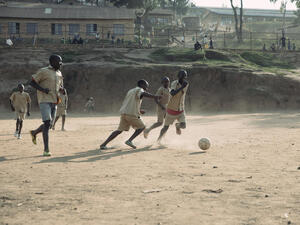Ruthless smugglers prey on unaccompanied minors on Sudan border
Ruthless smugglers prey on unaccompanied minors on Sudan border

Unaccompanied minors at Shagarab camp in eastern Sudan.
SHAGARAB CAMP, Sudan, September 20 (UNHCR) - When 16-year-old Hatim* and two friends left Eritrea for neighbouring Sudan last April they carried only their mobile phones and some extra clothes. Fleeing forced conscription, they thought Sudan was just a short trek away.
But six weeks passed before the trio, half starved and in need of medical aid, stumbled into Shagarab, one of eight refugee camps run by UNHCR in eastern Sudan. They were among more than 1,000 unaccompanied minors who have arrived in Sudan from Eritrea over the last year.
Many, like Hatim and his companions, fall into the hands of ruthless smugglers-turned-kidnappers who prey on those fleeing Eritrea in the hope of forcing their families to pay for their freedom. The UN refugee agency is concerned about this development and about the welfare of unaccompanied minors, who are vulnerable to smugglers, traffickers and kidnappers.
"UNHCR has received several reports by asylum-seekers referring to similar stories of extortion by traffickers upon their arrival in Sudan," said Rebeca Cenalmor-Rejas, a protection officer in Kassala, near Shagarab. She added that UNHCR has urged the Sudanese government to intervene "to prevent similar events in the future."
Five months after arriving in Shagarab, Hatim is thin but looks healthy. He has been staying in the camp's special centre for unaccompanied minors, where the young residents receive food, shelter and security and have access to games, television and language classes in Arabic and English.
Hatim wants to stay and go to school in Sudan, but for many of the unaccompanied minors and refugees who make it across the border, Shagarab is just a pit stop on the road to the Sudanese capital, Khartoum, the Middle East or Europe, and what they hope will be a better life.
Like so many other males fleeing Eritrea, Hatim left to escape conscription. It was a spur of the moment decision. He had quit school to contribute to his family's survival when he received a letter from the army ordering him to report for duty.
"I told two friends about the letter and that I was going to Sudan. They were already doing military service but [were] on leave, and that evening the three of us left together," he told UNHCR. "We knew Sudan was to the west and it was close. … We only brought our mobiles with us."
Hatim and his companions soon realised they had been a bit too optimistic. "We kept walking but it was so long we started to feel hungry and thirsty. The journey was farther than we expected, so we slept on the ground."
On the third day, they met some shepherds. "They said we were close to a water reservoir near the border with Sudan. We could see it in the distance," Hatim recalled. They were heading towards it when about 10 men armed with sticks and swords suddenly appeared.
The boys knew the men were from a nomadic tribe that lives along the border and engages in smuggling and, increasingly, extortion. They demanded to know if the young men had family abroad who could be contacted by phone and asked for ransom money - many Eritreans have fled to Western nations.
The nomads took the young men's clothes as well as their mobile phones and identity papers and drove them to an area thick with trees and shrubs. They were chained to the trees for a staggering four weeks, relieving themselves where they were chained and sleeping in the mud when it rained.
Each morning they were given a small bowl of porridge and a small can of dirty water. It was often unbearably hot and sunny, but that was not the worst of things. "The place was full of [small brown] snakes and when they came we were helpless. Sometimes they crawled over us and sometimes we lifted our legs to let them pass," recounted Hatim, adding that the boys were also tormented by scorpions.
The nomads threatened to kill Hatim and his friends and sell their internal organs if they did not ask their parents to send money. "But since we did not have anyone to send it, they just hit us," Hatim said.
Prohibited from speaking, Hatim said the three companions "just looked at each other. Obviously we were afraid of being killed, and sometimes we regretted leaving as we thought it was better to die in our own country."
After three weeks, they were joined by about 10 other young Eritrean men and women and an infant, but a ransom was paid within a few days and these people were taken away. After the release of this group, the nomads became impatient with Hatim and his companions and, probably realising they would not get any money, drove them out one day and dumped the three near Shagarab.
"The three of us were sick and one friend needed help to walk," Hatim said. "However, we could not assist him for long and we went ahead for help. After that, the people at the camp were very helpful to us. We explained our situation . . . and then they took us to pick up our friend."
Meanwhile, Hatim's companions are gone; one is in Khartoum and the other made it to Israel. But he said he has no plans to run away again, perhaps chastened by his experience with the nomads. He now dreams of becoming a mechanic, happy to have escaped from the desert alive.
* Name changed for protection reasons
By Karen Ringuette in Shagarab Camp, Sudan
Selected reading on human trafficking and the application of refugee protection.








